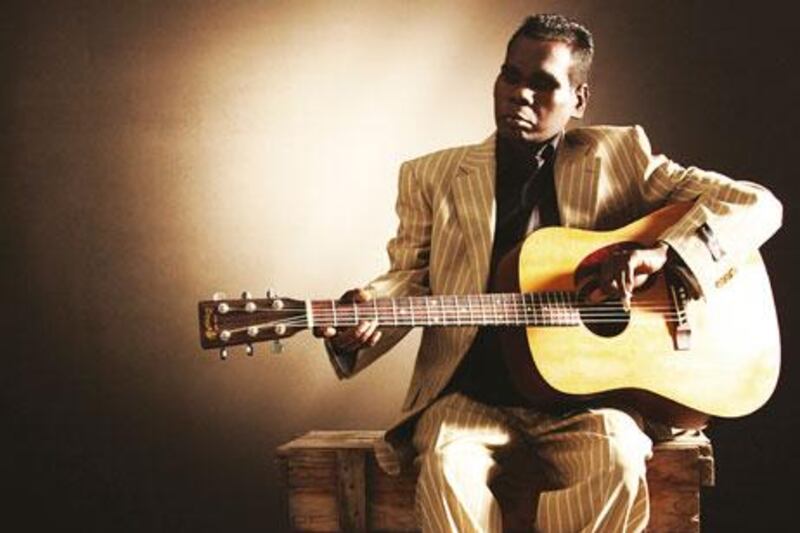Geoffrey Gurrumul Yunupingu's extraordinary rise is one of the great recent success stories in contemporary music. Gurrumul - as the recording artist is known - is an Australian Aboriginal musician who was born blind on Elcho Island, off the coast of northern Australia, in 1970. His eponymous debut album was released on the tiny, Darwin-based, independent label Skinnyfish and went on to sell more than 120,000 copies in Australia then sold more than 500,000 copies in Europe. All this was achieved purely by the haunting beauty of the music alone - Gurrumul refuses all interviews and rarely performs, preferring to live traditionally with his clan on Elcho Island.
Music: The National listens
Music reviews, festivals and all things sound related
[ Music ]
A European tour scheduled for 2010 was cancelled and many observers wondered if Gurrumul would ever choose to venture far from home. Yet a brand new album, Rrakala, has just been released and Gurrumul is heading to Europe next month for an eight-date concert tour, from October 4-17.
Gurrumul, who first experienced the rigours of the music industry and its attendant media circus in the 1990s as a member of the Aboriginal rock group Yothu Yindi, still is not giving interviews. Yet he is aware that he has to promote his albums and thus lets his producer/bassist Michael Hohnen, an Australian who once played in rock bands, speak on his behalf. Speaking over the phone from Brisbane, Hohnen confesses he is amazed by just how internationally successful Gurrumul has become.
"I grew up in Melbourne's music scene," says Hohnen, "and enjoyed a good deal of success, but it got to the point where I wanted to go and do something that was not the typical western cultural route of music. In my late twenties I realised I knew nothing about Aboriginal Australian culture. I left southern Australia for northern and it is amazing up there. There are so many Aboriginal people and they speak around 30 languages. I was so impressed with the level of musical talent that I became one of the founders of the Skinnyfish label and began working with The Saltwater Band."
Gurrumul is a member of The Saltwater Band and their third album Malk has just been released internationally. Malk features Gurrumul singing on several songs.
"Working with The Saltwater Band I was very impressed by Gurrumul's contributions and that's what gave me the idea to do an entire album focused on his voice and songs. When we cut his debut album in 2007 we had no expectations. Once it came out, positive word of mouth just saw it sell more and more."
Hohnen suggests that the beauty and eloquence of Gurrumul's music is what won over audiences. That and Gurrumul's ability to reinvent the singer-songwriter genre.
"Someone high in the US music industry said to us 'it's rare to hear an original. We're used to hearing clones of other successful artists'. That is important - he's playing acoustic guitar and singing but never sounds like someone you have heard before. He is not an imitator. He makes room on the shelf for the new."
Gurrumul grew up immersed in clan culture while also listening to pop radio. He likes The Eagles, Bob Marley, UB40 and Dire Straits and it is his soft melodies and high, yearning voice that capture listeners.
"People have come to expect Aboriginal music to be didgeridoo and click sticks," says Hohnen, "but we don't have either on Gurrumul's albums. We avoid clichés and in this sense present a very true and very contemporary face of Aboriginal culture."
I enquire as to whether Gurrumul is singing sad songs - his voice conveys what sounds to me a deeply felt melancholy.
"Sad? No," says Hohnen. "His songs are more about longing for and retaining that constant connection to place and identity. I spend a lot of time with Gurrumul and his family and it's part of their DNA to sing to keep their culture alive. If they don't sing they won't exist anymore."
Hohnen then adds: "I think a lot of western fans of Gurrumul unconsciously connect with this yearning as they too yearn for land, place, family. They hear in his music something we have largely lost."
Australia's Aboriginal people are most often in the international news when topping the list of worst statistics. Dying younger than any other ethnic group in the West, they remain a marginalised minority who have not benefited from Australia's booming prosperity. Hohnen agrees that Gurrumul's success has proved a huge confidence boost to the Aboriginal community. "The amount of feedback we get about the pride felt, well, it's amazing. But Gurrumul isn't really aware of all that. He's on his and his family's journey. He's so engrossed in playing and performing that he has no interest at all in the political side of things."
- For more information, visit www.gurrumul.com
Follow us on Twitter and keep up to date with the latest in arts and lifestyle news at twitter.com/LifeNationalUAE





